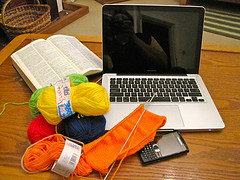As you may have heard, I use a lot of social networks. It’s interesting, really, to explore different networks and decide whether or not they fit into your lifestyle, and then how you use them. That last piece is really important. Every network, I think, has a way that its developers originally foresaw it being used. How each of us uses a network, though, can be subject to some interpretation…just like an author and a reader of good fiction.
Take, for example, Facebook. I used to be quite enamored with the book of faces, and it has certainly had a positive impact on my life. Then, I went through a phase in which I really didn’t use it that often, which was right after Karen and I were married. Then came a brief addiction to Mafia Wars, and now I’m recovered and have discovered that Facebook has lost any identity of its own as it has attempted to copy what others have done well. Further, their complete disregard for privacy turns my stomach.
I keep a Facebook account, although I don’t really post to it very often. I have other things that show up there automatically, but I typically use it to simply keep in contact with friends and colleagues with whom I would have otherwise lost touch. All of those functions could, I think, be better served on other networks, but Facebook seems to be the lowest common denominator where everyone has a profile of some sort.
Tonight, I ran a quick errand to the neighborhood grocery store for a couple of essentials that we found conspicuously absent from our refrigerator. Upon leaving the store, I passed a woman that a quick memory search revealed that I know. Sort of. We did some theatre together briefly. We exchanged a quick “hello” in passing, and went about our way. That was the extent of the conversation that I’ve with this woman for about two years.
However, we’re “friends” on Facebook. With a few clicks she could see more details about my life than I care to consider, and I about hers. Odd, isn’t it, how we consider digital friendships? In theory, they are extensions of our “real” friendships, except they’re more generic than that. In truth, I would call this woman an acquaintance. On Facebook, however, I only have the option of “friend.” No option for colleague, no option for family member. Only friend. Even if you’re only sort-of-not-really friends.
That’s what gives me pause. At first blush, it makes me wish that people used more networks, because the spaces for different sorts of connections can be more customized that way. At a deeper level, though, it makes me want to re-consider how we connect in the digital realm.
Photo Attribution: Kr. B.




